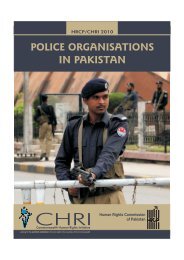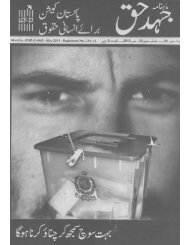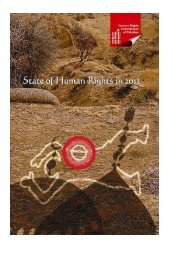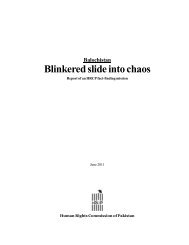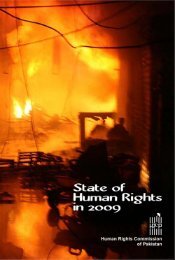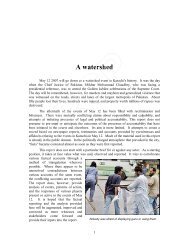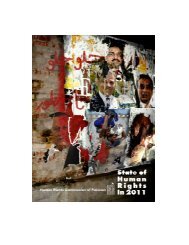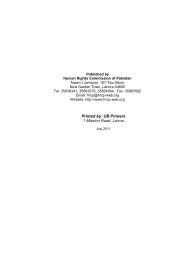Download PDF file - Human Rights Commission of Pakistan
Download PDF file - Human Rights Commission of Pakistan
Download PDF file - Human Rights Commission of Pakistan
- No tags were found...
You also want an ePaper? Increase the reach of your titles
YUMPU automatically turns print PDFs into web optimized ePapers that Google loves.
Analysis and recommendations 413Draft Punjab Police Act, 2010Analysis and Recommendation forAmendmentsIntroductionWith policing in Punjab (specifically) and <strong>Pakistan</strong> (generally) largely unchanged since the British colonialperiod, the performance <strong>of</strong> law enforcement agencies throughout the country is <strong>of</strong>ten unpr<strong>of</strong>essional, unaccountableand unsatisfactory. The deficiency stems from a number <strong>of</strong> factors. First, there is tremendous political interferencein the functioning <strong>of</strong> police. Second, there are very few functional mechanisms to hold the police accountable forwrongdoing. Third, the police are seriously under-resourced and ill-equipped to meet the challenges posed by violentinsurgency (specifically) and maintenance <strong>of</strong> law and order (generally).The Police Order, 2002 was premised on police service’s autonomy, public oversight, accountability andsecurity <strong>of</strong> tenure. However, the Order failed to bring in the reforms it promised because, among other things, it wasa federal law lacking provincial ownership; provincial governments resisted implementation as took away powers tocontrol the police; it had an unrealistic organizational design; there was resistance amongst the police and civilbureaucracy; and finally several amendments through a Presidential Ordinance in 2004 1 took away the operationalautonomy and distorted the accountability mechanisms.A read <strong>of</strong> the Draft Punjab Police Act, 2010 (DPPA) suggests that it has borrowed from the Police Orderwith significant alterations. It makes an attempt to achieve greater operational autonomy for the police, flexibility inadministration and a clear chain <strong>of</strong> command for the police. However, in the deviation several <strong>of</strong> the safeguards andthe progressive elements <strong>of</strong> the Police Order have been lost. At the outset the tone <strong>of</strong> the DPPA is one that suggeststhe police are a force rather than a service. It fails to incorporate the principles <strong>of</strong> democratic policing that wouldprovide the people <strong>of</strong> Punjab with a pr<strong>of</strong>essional, efficient and accountable police.The accountability provisions have been seriously weakened with the justification that the internal accountability<strong>of</strong> the police will be sufficient to discipline errant <strong>of</strong>ficers. The model for superintendence and oversight in the form<strong>of</strong> the Provincial Police Council is not one that clearly defines the Police-Executive relationship. This will onlyincrease the corrosive influence <strong>of</strong> politics on policing.Overall, the DPPA does not qualify as a strong progressive legislation to meet the modern day needs <strong>of</strong>



